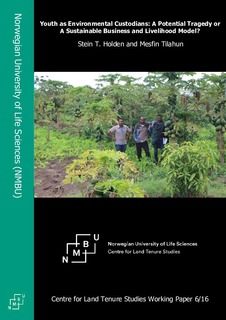Location
NMBU's mission is to contribute to the well-being of the planet. Our interdisciplinary research generates innovations in food, health, environmental protection, climate and sustainable use of natural resources.
About NMBU
NMBU's research is enabling people all over the world to tackle the big, global challenges regarding the environment, sustainable development, how to improve human and animal health, renewable energy sources, food production, and land- and resource management.
Members:
Resources
Displaying 26 - 30 of 98Learning from REDD+: a response to Fletcher et al.
Although REDD+ is approaching its 10th anniversary, major impacts in terms of reduced forest loss are hard to document. Conservation practitioners and scholars are therefore increasingly asking why REDD+ has not delivered more tangible results. A recent Comment in Conservation Biology by Fletcher et al. (2016) addresses this question. We agree with Fletcher et al. that REDD+ has been hyped in some circles, which has created unrealistic expectations among policy makers and forest dwellers alike. Yet, we argue that Fletcher et al.
Land distribution in Northern Ethiopia from 1998 to 2016: Gender-disaggregated, spatial and intertemporal variation
This study utilizes land registry data from the First and Second Stage Land Registration Reforms that took place in 1998 and 2016 in sampled districts and communities in Tigray region of Ethiopia. Tigray was the first region to implement low-cost land registration and certification in Ethiopia and providing household level land certificates in the names of household heads. Second Stage Land Registration and Certification (SSLRC) is scaled up since 2015 and provides households with parcel-based certificates with maps. The SSLR&C lists all holders of parcels by name and gender.
Policies for improved food security: The roles of land tenure policies and land markets
This paper provides an overview of what we know about farm size distributions, the emerging land markets, the role of tenure systems, tenure reforms and land policies in shaping the distribution of increasingly scarce land resources. The primary focus is on Africa while making some comparisons with Asia. Climate risk and change have serious implications for household vulnerability and food security. While there is a need to absorb further population growth in rural areas, a rapid rise in rural-urban migration is inevitable.
Can the land rental market facilitate smallholder commercialization? Evidence from northern Ethiopia
The paper utilizes household panel data to investigate whether the land rental market can facilitate improved access to land for land-poor tenant households over time and thereby facilitate expansion of their farming activity. The paper utilizes data 8-17 years after land certification to assess the long-term effect of land certification on the allocative efficiency in the land rental market in areas where land certification stimulated land renting in the early years after certification.
Youth as environmental custodians : a potential tragedy or a sustainable business and livelihood model?
Youth unemployment and migration is a growing challenge that needs more political attention in many countries in the world, particularly countries with rapid population growth and economic transformation. Proactively mobilizing the youth as a resource in the creation of sustainable livelihoods can potentially be a win-win-win solution that Ethiopia is currently attempting with its new youth employment strategy and high ambitions to transform the country’s economy into a Green Economy. If it succeeds, it can set an example for other countries in the world to follow.




